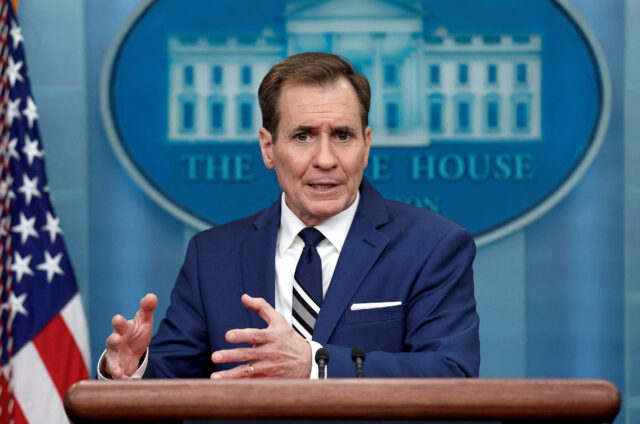The White House has urged Serbia to pull back what it said is a large military deployment from its border with Kosova amid rising tensions after deadly clashes this week in a Kosovar village.
“We are calling on Serbia to withdraw those forces from the border,” White House National Security Council spokesman John Kirby told reporters on September 29, adding that the build-up was a “very destabilizing development.”
U.S. Secretary of State Antony Blinken has spoken with Serbian officials, and national-security adviser Jake Sullivan has spoken with Kosovar officials, Kirby said.
“We are monitoring a large Serbian military deployment along the border that includes unprecedented staging of advanced Serbian artillery, tanks, and mechanized infantry units. We believe that this is a very destabilizing development,” Kirby said in a conference call.
He also said there would be an increase in the peacekeeping force known as KFOR in northern Kosova. There currently are about 600 U.S. forces participating in the force, he said.
Serbian President Aleksandar Vucic said he had spoken on the phone with Blinken, and they “agreed that de-escalation is needed” along with a greater role for KFOR.
Milan Radoicic, the top official of the main ethnic-Serb political party in Kosova, admitted earlier to organizing and participating in the events that sparked the most recent clash with police, which occurred at an Orthodox monastery in Kosova and left four people dead.
In a statement read by his lawyer on September 29 in Belgrade, Radoicic said that he “personally made all the logistical preparations,” adding that the Serbian government had no knowledge of what was happening.
Radoicic described his actions as a way to “encourage Serbs” from the region to resist what he called “the terror of [Kosova Prime Minister Albin] Kurti’s regime.”
The admission comes days after Kosova accused the ethnic-Serb politician of organizing and participating in the attack in Banjska on September 24, in which three attackers were killed, along with a Kosovar police officer.
Prishtina has said that at least six of the suspected attackers who escaped were in Serbia and demanded Belgrade hand them over to Kosovar authorities.
Kosovar Interior Minister Xhelal Svecla told RFE/RL in an interview that Radoicic didn’t act alone and said he had been “continuously supported by Vucic” and the government of Serbia. He claimed it was Vucic and his “extremist ideas related to the whole region” that were the real culprit behind the attack on the monastery.
He also said Kosova will continue to investigate in an effort to identify all those involved in the attack and will ask Serbia to surrender all participants who managed to escape to surrender to Kosova’s justice system.
He added that the investigation thus far has shown that “over 80 terrorists” were involved in the attack and confirmed that the probe is looking into possible Russian involvement.
More than 20 cars filled with ammunition and other materials were found, and in one of them there were Russian materials, as well as two engines for use in difficult terrain manufactured by Russia that had been donated to the Serbian Army, he told RFE/RL. There is also intelligence information about the involvement of elements that are directly linked to Russia, he said.
Svecla said in an interview on September 28 with the Associated Press that Russian weapons, other equipment, and documents suggesting Russian involvement had been found.
Vucic, who has denied claims that Serbia was involved in the clashes saying the gunmen were local Kosova Serbs “who no longer want to withstand the terror” of Kosova’s ethnic Albanian authorities, told Serbian state television that Radoicic would be questioned by the Serbian authorities about the matter.
“He will certainly respond to the invitation of the competent authorities of Serbia, I am convinced that he will be heard,” Vucic said.
“He considers himself a fighter for freedom, he has never given up on his comrades and he will never give up, but there are things and questions that he will have to answer,” he added.
Radoicic is a construction tycoon as well as a top official of the main ethnic Serb political party in Kosova, Serbian List, funded mainly by Belgrade. He was hit with sanctions by the United States and Britain in 2021 for allegedly being part of an organized crime group.
Kosova has accused Serbia of direct involvement in the clashes, which Belgrade denies.
Xhelal Svecla told the Associated Press in a September 28 interview that investigators were looking at evidence linking Russia, an ally of Serbia, to the armed assault.
Russian weapons, other equipment and documents suggesting Russian involvement were discovered after the daylong gun battle, he said.
Svecla also alleged that the insurgents had come from Serbia and that they were trained in camps in Serbia.
“We found some documents which lead us to a suspicion that there were individuals coming from Russia too,” he added.
“For the equipment, we have evidence, but for the people we still have only suspicion.”
The monastery attack further raised tensions in the region at a time when European Union and U.S. officials have been pushing for a deal that would normalize ties between Serbia and Kosova. (Radio Free Europe/Radio Liberty)
